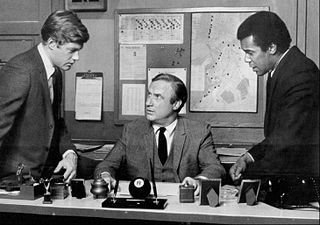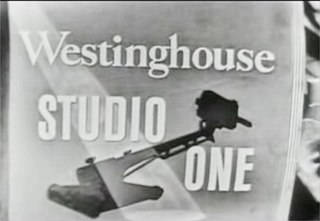Related Research Articles

Raymond William Stacy Burr was a Canadian actor who had a lengthy Hollywood film career and portrayed the title roles in the television dramas Perry Mason and Ironside.

Steven Ronald Bochco was an American television writer and producer. He developed a number of television series, mostly crime dramas, including Hill Street Blues; L.A. Law; Doogie Howser, M.D.; Cop Rock; and NYPD Blue.

Pee-wee's Playhouse is an American comedy children's television series starring Paul Reubens as the childlike Pee-wee Herman that ran from 1986 to 1990 on Saturday mornings on CBS, and airing in reruns until July 1991. The show was developed from Reubens's popular stage show and the TV special The Pee-wee Herman Show, produced for HBO, which was similar in style but featured much more adult humor.

N.Y.P.D. is a half-hour long American police crime drama set in the context of the New York City Police Department. The program aired on the ABC network from 1967–1969 in the 9:30 p.m. night time slot. During the second season, N.Y.P.D was joined by The Mod Squad and It Takes a Thief to form a 2½ hour block of crime dramas.

The Bob Cummings Show is an American sitcom starring Bob Cummings, which was broadcast from January 2, 1955, to September 15, 1959.

Playhouse 90 is an American television anthology drama series that aired on CBS from 1956 to 1960 for a total of 133 episodes. The show was produced at CBS Television City in Los Angeles, California. Since live anthology drama series of the mid-1950s usually were hour-long shows, the title highlighted the network's intention to present something unusual: a weekly series of hour-and-a-half-long dramas rather than 60-minute plays.

The Twilight Zone is an American fantasy science fiction horror anthology television series created and presented by Rod Serling, which ran for five seasons on CBS from October 2, 1959, to June 19, 1964. Each episode presents a standalone story in which characters find themselves dealing with often disturbing or unusual events, an experience described as entering "the Twilight Zone", often with a surprise ending and a moral. Although often considered predominantly science-fiction, the show's paranormal and Kafkaesque events leaned the show much closer to fantasy and horror. The phrase "twilight zone" has entered the vernacular, used to describe surreal experiences.
Gerald William Abrams is an American television producer who has produced many TV movies starting in the mid-1970s.

Studio One is an American anthology drama television series that was adapted from a radio series. It was created in 1947 by Canadian director Fletcher Markle, who came to CBS from the CBC. It premiered on November 7, 1948, and ended on September 29, 1958, with a total of 467 episodes over the course of 10 seasons.
Prudence Fenton is an American film, television and music video producer. She won a Grammy for producing and co-creating the music video for Peter Gabriel's 1992 single "Steam".

The second season of Homicide: Life on the Street, an American police procedural drama television series, originally aired in the United States between January 6 and January 27, 1994. Due to low Nielsen ratings during the first season, NBC executives decided to order only a four-episode season, after which they would evaluate the ratings and decide whether to renew the show. Homicide was moved to a new timeslot of Thursdays at 10 p.m. EST, temporarily replacing the legal drama L.A. Law. NBC requested several changes from the series, including fewer episode subplots and less camera movements and jump cuts.

Martin Ellyot Manulis was an American television, film, and theatre producer. Manulis was best known for his work in the 1950s producing the CBS Television programs Suspense, Studio One Summer Theatre, Climax!, The Best of Broadway and Playhouse 90. He was the sole producer of the award-winning drama series, Playhouse 90, during its first two seasons from 1956 to 1958.
Robert Illes is an American award-winning screenwriter, television producer, playwright and author.
Paul Monash was an American television and film producer and screenwriter.
George Bellak was an American television writer who was active from the 1950s to the 1980s. He wrote episodes for Justice, (1954), Playhouse 90 (1957-1959), The Asphalt Jungle (1961), N.Y.P.D. (1967-1968), Cannon (1970-1975), and dozens of others. He was a winner of Writers Guild of America Award, and was nominated for an Emmy award for his teleplay "Sadbird" as part of the CBS Playhouse series.
Elmer Albert Heschong was an American art director and production designer, principally for television. In a career that spanned more than 40 years, he worked on over 2,500 productions and was posthumously inducted into the Art Directors Guild Hall of Fame.
James B. Clark Jr. was an American film director, film editor, and television director. His career as a film editor began in 1937, and he was nominated for the Academy Award for Best Film Editing in 1941 for How Green Was My Valley. He continued to work as a film editor until 1960, but in 1955 also began a career as a film and television director. He tended to focus on works involving people's relationships with animals. Among the more popular and notable projects he directed were the films A Dog of Flanders (1959), The Sad Horse (1959), Misty (1961), Flipper (1963), Island of the Blue Dolphins (1964), and My Side of the Mountain (1969), and episodes of the television series My Friend Flicka (1955–1956), Batman (1966–1967), and Lassie (1969–1971).
Herbert Brodkin was an American producer and director of film and television.
The Daytime Emmy Award for Outstanding Cinematography is given by the National Academy of Television Arts and Sciences in the US for single-camera work in daytime television. The Daytime Emmy Awards are among the more prominent categories of Emmy Award.

The Moon and Sixpence was an American television movie broadcast on NBC on October 30, 1959. The production, starring Laurence Olivier, was adapted by S. Lee Pogostin from the novel by Somerset Maugham. The production won multiple Emmy and Sylvania Awards, including awards for Olivier's acting, Pogostin's adaptation, and Robert Mulligan's direction.
References
- ↑ "Robert Joseph "Bob" Markell". Shelter Island Reporter. Retrieved 11 February 2020.
- 1 2 Archives and Special Collections Finding Aids: Robert Markell. Northeastern University Libraries, Archives and Special Collections. Web. Accessed 19 September 2014.
- 1 2 3 4 Bob Markell . Web. Accessed 16 October 2014.
- ↑ Bob Markell Interview . Archive of American Television. Web. Accessed 22 October 2014.
- 1 2 3 4 5 6 7 8 9 10 11 12 13 Bob Markell - Filmography. The New York Times. Web. Accessed 23 November 2014.